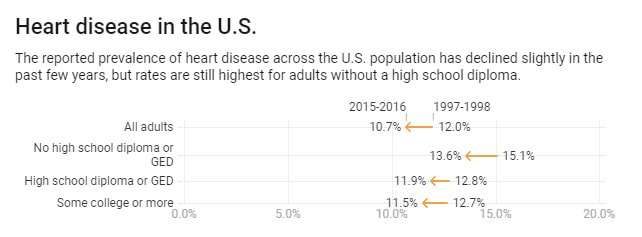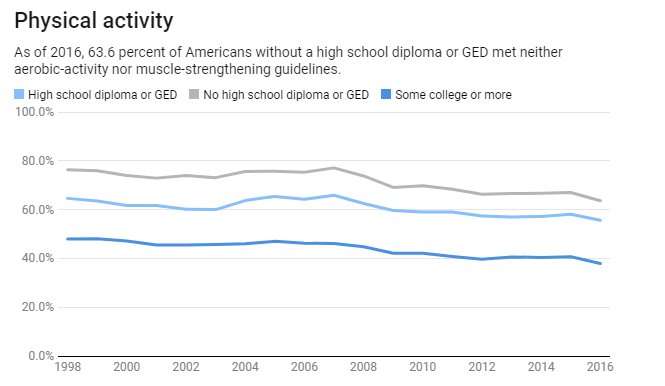Americans who don't finish high school are less healthy than the rest of the US

,On Sept. 20, the Centers for Disease Control and Prevention released the latest numbers on health in the U.S.
This report provides a snapshot of Americans' health up to 2016, revealing several key trends – including that Americans who don't finish high school continue to lag behind. Again and again, the trends across educational levels indicate that adults with no high school diploma or GED are consistently at the greatest risk for the leading causes of disease and death.
For example, heart disease has declined in the U.S. since 1997, down to 10.7 percent across the population. Heart disease declined among people with less than high school education across years, yet this population consistently had the highest reported percent for heart disease compared to adults with a high school diploma or higher.
Smoking also declined overall during the same period, while participation in physical activities that meet federal guidelines increased. These are both very positive trends. But clear differences are consistently seen across education levels. In fact, in 2016, close to two-thirds of adults with no high school diploma did not engage in physical activity, compared to 55 percent of high school graduates and 38 percent of adults with some college or more.

Similar trends can be observed in access to health care, frequency of cancer screenings and other clinical preventive services.
Why is education so closely linked with health? According to a report released by the Administration for Healthcare Research and Quality, adults with low levels of education experience extra stress, partly due to problems with finances and getting employment. Adults who report low levels of education also tend to have experienced a greater number of childhood adversities. Without positive coping mechanisms, stress harms the body in many different ways, leading to poor health.
Education is not just about receiving a diploma; it's the process of acquiring knowledge and skills that can help people adapt, cope and utilize critical thinking. Research has shown that not completing high school education is linked to poor health literacy skills, which are necessary to navigate the health care system. For example, health literacy skills can help someone take medications properly; interpret medication labels or food labels; and find the appropriate preventive care.
The movement toward formal education, which started in the early 1800s, was motivated by the belief that education would help children lead productive adult lives. Indeed, over the past 150 years, the U.S. has witnessed major progress in terms of [educational enrollment and completion]. But people who don't finish high school – who make up 10 percent of the population – may lack the skills to know how to care for themselves. That leaves them at higher risk for multiple health outcomes compared to adults with high school diploma or greater.
Math, science, reading and writing are very important skills for children, but, in my view as a public health researcher, social and emotional learning are just as critical. The state of New York is implementing a curriculum where children in elementary to high school can learn about mental and emotional health. The impact of this bill has yet to be understood, but it may be one of many solutions to successfully bridge the gap between education and health.
This article is republished from The Conversation under a Creative Commons license. Read the original article.![]()



















